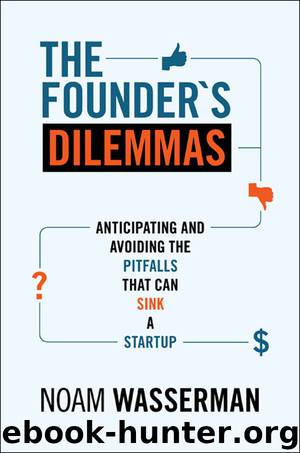The Founder's Dilemmas: Anticipating and Avoiding the Pitfalls That Can Sink a Startup (The Kauffman Foundation Series on Innovation and Entrepreneurship) by Noam Wasserman

Author:Noam Wasserman [Wasserman, Noam]
Language: eng
Format: azw3
Publisher: Princeton University Press
Published: 2012-03-25T04:00:00+00:00
C-level versus VP-level Equity Stakes
During the early days of a startup, equity stakes tend to be individually tailored to each new hire. But as a startup matures, this ad-hoc approach can cause trouble. Dick Costolo ran into this problem as FeedBurner grew: “Our CFO had been a venture capitalist and pointed out that we needed to [clean up all our ad-hoc equity arrangements with our employees] so all new hires would be in the same boat. . . . [E]veryone’s interests weren’t aligned.” Dick and the CFO were able to bring consistency to the equity packages for subsequent hires, but the inconsistency among early hires ended up causing alignment problems when FeedBurner later received an acquisition offer. Employees with one equity structure wanted to take the offer while others did not, causing divergence within the team at a crucial juncture.
Yet, even in the youngest of startups in my dataset, there are some consistencies. While the salaries of VP-level executives are often on par with those of some C-level executives (most notably, the CTO and CFO), equity stakes are much more strongly linked to organizational level. Nonfounding CEOs have significantly more equity than the rest of the C-level executives, who usually have more equity than VPs. Across the full decade of my dataset, nonfounding CEOs averaged equity stakes of 6.0%, COOs 2.9%, CTOs 1.7%, and CFOs 1.3%. The four main VP-level positions all averaged 1.0% to 1.3% of equity.
Figure 8.7 graphs the equity and cash compensation differences across these positions, using as a baseline the VP-marketing, the lowest-paid and lowest-stake executive in the core executive team. Most members of the team earn within 5% of the VP-marketing’s cash compensation; even the CEO makes only 1.7 times as much. The equity-stake differentials, however, are far greater; the CEO’s stake is more than 6 times that of the VP-marketing.
The stage of the startup also significantly affects equity stakes through dilution and uncertainty. First, each time a startup raises a round of financing, the equity stakes of existing equity holders decrease—they are “diluted”—because new shares are issued to the new investors. For instance, if a nonfounding CEO owns 10% of the startup and then the startup raises $5 million on a pre-money valuation of $10 million, the CEO’s equity stake would be diluted to 6.7%. Second, during the early days of the startup, when uncertainty is high and hires are taking a big risk by joining, the startup has to offer larger equity stakes to attract them. But as the risk is lowered, startups can offer lower equity stakes,* reinforcing the negative relationship between startup maturity and the size of hires’ equity stakes. In my 2009 technology-startup data, the nonfounding CEOs of early-stage startups that had raised two or fewer rounds of financing averaged 7.1% equity stakes; their counterparts in later-stage startups that had raised three or more rounds averaged 5.2%. In life sciences, the gap was even larger: 2.5% instead of 1.9%.
Download
This site does not store any files on its server. We only index and link to content provided by other sites. Please contact the content providers to delete copyright contents if any and email us, we'll remove relevant links or contents immediately.
Pioneering Portfolio Management by David F. Swensen(6289)
Man-made Catastrophes and Risk Information Concealment by Dmitry Chernov & Didier Sornette(6007)
Zero to One by Peter Thiel(5787)
The Motivation Myth by Jeff Haden(5205)
The Miracle Morning by Hal Elrod(4713)
Elon Musk by Ashlee Vance(4121)
Unlabel: Selling You Without Selling Out by Marc Ecko(3658)
The Art of Persistence: Stop Quitting, Ignore Shiny Objects and Climb Your Way to Success by Michal Stawicki(3648)
Delivering Happiness by Tony Hsieh(3418)
Urban Outlaw by Magnus Walker(3392)
Purple Cow by Seth Godin(3197)
The Marketing Plan Handbook: Develop Big-Picture Marketing Plans for Pennies on the Dollar by Robert W. Bly(3056)
Mastering Bitcoin: Programming the Open Blockchain by Andreas M. Antonopoulos(3035)
The Power of Broke by Daymond John(2975)
The Content Trap by Bharat Anand(2917)
Applied Empathy by Michael Ventura(2892)
The Airbnb Story by Leigh Gallagher(2851)
Keep Going by Austin Kleon(2756)
Radical Candor by Kim Scott(2715)
